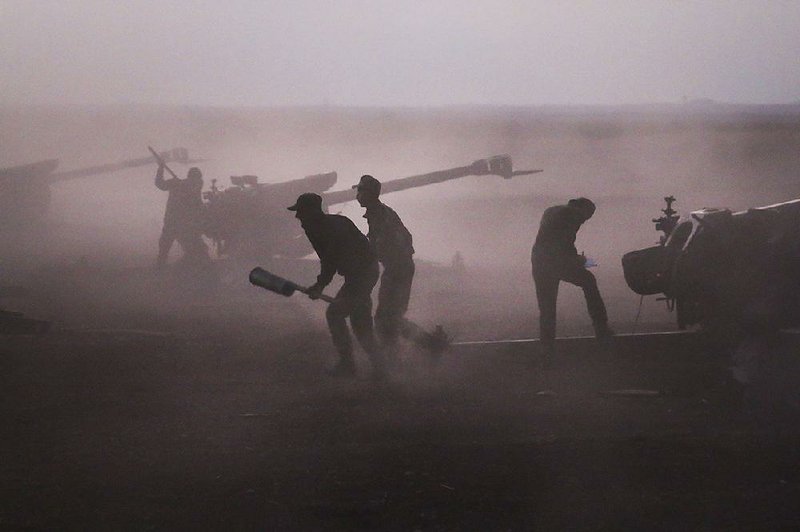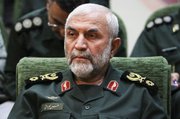BEIRUT -- Islamic State militants seized several villages from rival insurgents north of the city of Aleppo on Friday, in a surprise attack that came despite intensive Russian airstrikes that Moscow insists are targeting the extremist group, activists said.
Nearby, a senior commander in Iran's powerful Revolutionary Guard was killed by the Islamic State on the outskirts of Aleppo, Iranian state media reported.
An Iranian state television report said Gen. Hossein Hamedani was killed while "carrying out an advisory mission." It didn't provide any further details. The official IRNA news agency read a statement by the Guard in which it blamed the extremist group for his death.
The developments come during a wave of Russian airstrikes that have targeted insurgents fighting to topple President Bashar Assad and a ground offensive by the Syrian army in the country's central region.
Moscow says it is targeting mainly Islamic State militants, but U.S. officials and Syrian rebels have said the strikes have hit rebel groups, as well, and are designed to shore up Assad's embattled government and troops.
At same time, France's defense minister said 80 percent of Russian airstrikes aren't targeting the Islamic State. France is carrying out airstrikes over Syria, as is a U.S.-led coalition.
But in a sign of willingness to improve communication over the strikes, the Pentagon said Friday night that Russian leaders have responded to a proposed draft of safety guidelines for military aircraft in the increasingly crowded skies over Syria.
Pentagon press secretary Peter Cook said Friday that a second round of talks between the two countries about the plan could take place as soon as this weekend. The U.S. and Russia are trying to hash out flight procedures to ensure that there are no collisions or other incidents as both countries conduct bombing operations in Syria.
Cook told reporters traveling back from Europe with Defense Secretary Ashton Carter that the Russians sent a formal reply and department officials are currently reviewing it, but he provided no details.
The response comes on the heels of a series of Russian aircraft incidents that raised concerns about the potential for mishaps as the U.S.-led coalition continues to launch daily airstrikes against Islamic State militants in Syria.
A day earlier, the North Atlantic Treaty Organization warned Russia against escalating its campaign in support of Assad. The military alliance prepared to step up support for Turkey over airspace violations by Russian jets. Russia's actions are unacceptable, while NATO has "a duty to reinforce" its Turkish ally, Secretary-General Jens Stoltenberg said after a meeting of defense ministers in Brussels.
Russia must "stop interfering" and halt attacks in Syria as well as the violations of Turkey's airspace, Turkey's interim deputy prime minister, Numan Kurtulmus, said in an interview with state-run Anadolu Agency. Foreign forces should stop playing "war games" in Syria, where a new exodus of refugees could be triggered, while NATO's solidarity with Turkey is "very important," he said.
In its surprise attack, the Islamic State, also known by the acronym ISIS, seized a string of villages from rebels in Aleppo province Friday. The Britain-based Syrian Observatory for Human Rights said the advance by the extremists, which began Thursday night, is the most significant in months. It said the militants seized the villages of Tal Qrah, Tal Sousin and Kfar Qares north of Aleppo.
The group also seized a former army base known as the Infantry Academy that rebels captured from the Syrian army two years ago. The base is located around 10 miles northeast of Aleppo. Islamic State-affiliated Twitter accounts also announced that the militants had seized those villages.
It was not clear whether Hamedani's killing was related to that Islamic State offensive.
"Brig. Gen. Hamedani was martyred by Daesh terrorists during an advisory mission in the outskirts of Aleppo" on Thursday afternoon, said the statement read on IRNA, using an Arabic acronym for the group.
Hamedani is one of the most senior Guard commanders to be killed in Syria, and the second to be killed this year. He was a veteran commander who had an important role in Iran's 1980-88 war with Iraq.
Iran is one of Assad's main allies. Tehran has provided his government with military and political backing for years and has kept up its support since Syria's civil war began in 2011.
Guard commanders repeatedly have said Iran only has high-level advisers in Syria, denying that it has fighters there.
Meanwhile, Iraq's Defense Ministry said Friday that it was not informed when Russia launched 26 cruise missiles across its airspace this week, and it described the lack of coordination in the region's increasingly cluttered skies as "dangerous."
"Iraq didn't have any idea about those missiles," said Brig. Gen. Tahseen Ibrahim, a spokesman for the Iraqi Defense Ministry. "We have coalition forces air power in the air, our planes in the air, transportation. This is dangerous."
Ibrahim said Iraq would launch an "investigation" and raise concerns with Russia.
The incident occurred as Iraq appeared to be looking to expand cooperation with Russia, and just two weeks after the announcement of an intelligence-sharing deal between Russia, Iraq, Iran and Syria.
However, Ibrahim said, the coordination center is not yet fully functioning, which was why the information was not shared.
The lack of notification about Russia's cruise missiles was the main talking point when Gen. John Allen, the retired U.S. officer in charge of the international coalition to counter the Islamic State, visited the Iraqi Defense Ministry on Thursday, Ibrahim said.
Asked about coordination with the Iraqi military, a spokesman for the Russian Foreign Ministry directed a reporter to the Ministry of Defense, which did not respond to telephone calls or faxes Friday afternoon. Dmitry Peskov, the spokesman for Russian President Vladimir Putin, also did not return calls. Russian media have reported that there was coordination with both Iran and Iraq.
Information for this article was contributed by Zeina Karam, Nasser Karimi, Ali Akbar Dareini and Lolita C. Baldor of The Associated Press; by Helene Fouquet, James G. Neuger, Selcan Hacaoglu and staff members of Bloomberg News; and by Loveday Morris and Andrew Roth of The Washington Post.
A Section on 10/10/2015


